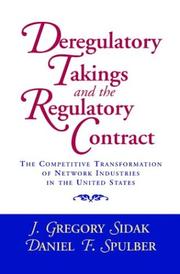| Listing 1 - 2 of 2 |
Sort by
|
Book
ISBN: 1316324265 1316310884 1316327604 131633094X 1316290255 1316334287 1107498228 1316181383 1316320901 9781316320907 110710078X 1316317560 9781316181386 9781316330944 9781316327609 9781316290255 9781107498228 9781107100787 9781316334287 Year: 2015 Publisher: Cambridge : Cambridge University Press,
Abstract | Keywords | Export | Availability | Bookmark
 Loading...
Loading...Choose an application
- Reference Manager
- EndNote
- RefWorks (Direct export to RefWorks)
The electric utility industry in the US is technologically complex, and its structure as a classic network industry makes it intricate in business terms as well, so deregulation of such a complicated industry was a particularly detailed process. Steve Isser provides a detailed and comprehensive analysis of the history of the transformation of this complex industry from the 1978 Energy Policy Act to the present, covering the economic, legal, regulatory, and political issues and controversies in the transition from regulated utilities to competitive electricity markets. The book is a multidisciplinary study that includes a comprehensive review of the economic literature on electricity markets, the political environment of electricity policymaking, administrative and regulatory rulemaking, and the federal case law that restrained state and federal regulation of electricity. Dr Isser offers a valuable case study of the pitfalls and problems associated with the deregulation of a complex network industry.
Electric utilities -- Deregulation -- United States -- History. --- Electric utilities -- Law and legislation -- United States -- History. --- Electric utilities -- United States -- History. --- Electric Utilities --- Electric utilities --- Business & Economics --- Industries --- Electric companies --- Electric light and power industry --- Electric power industry --- Electric industries --- Energy industries --- Public utilities --- History --- Deregulation --- Law and legislation --- Deregulation&delete& --- Law and legislation&delete& --- E-books --- History.

ISBN: 0521591597 0521658713 0511572220 9780521591591 9780511572227 9780521658713 Year: 1997 Publisher: Cambridge: Cambridge university press,
Abstract | Keywords | Export | Availability | Bookmark
 Loading...
Loading...Choose an application
- Reference Manager
- EndNote
- RefWorks (Direct export to RefWorks)
This 1998 book addresses deregulatory policies that threaten to reduce or destroy the value of private property in network industries without any accompanying payment of just compensation, policies that are termed 'deregulatory takings'. The authors further consider the problem of renegotiation of the regulatory contract, which changes the terms and conditions of operation of utility companies. They argue that constitutional protections of private property from takings, as well as efficient remedies for contractual breach, provide the proper foundation for the competitive transformation of the network industries. The benefits of competition do not stem from government regulations that redistribute income from utility investors to customers, nor do such benefits stem from regulatory policies for network access that promote free riding on incumbent facilities by entrants. Such actions represent a new version of increased regulation, not deregulation.
Telecommunication --- Electric utilities --- Public utilities --- Right of property --- Breach of contract --- Télécommunications --- Services publics d'électricité --- Services publics --- Droit de propriété --- Inexécution --- Deregulation --- Law and legislation --- Déréglementation --- Droit --- Télécommunications --- Services publics d'électricité --- Droit de propriété --- Inexécution --- Déréglementation --- Business, Economy and Management --- Economics --- Industrial economics --- Public economics --- Telecommunication services --- United States --- Telecommunication - Deregulation - United States --- Telecommunication - Law and legislation - United States --- Electric utilities - Deregulation - United States --- Electric utilities - Law and legislation - United States --- Public utilities - Deregulation - United States --- Public utilities - Law and legislation - United States --- Right of property - United States --- Breach of contract - United States --- Economic liberties (U.S. Constitution) --- Municipal utilities --- Public-service corporations (Public utilities) --- Utilities, Public --- Utility companies --- Municipal franchises --- United States of America
| Listing 1 - 2 of 2 |
Sort by
|

 Search
Search Feedback
Feedback About UniCat
About UniCat  Help
Help News
News